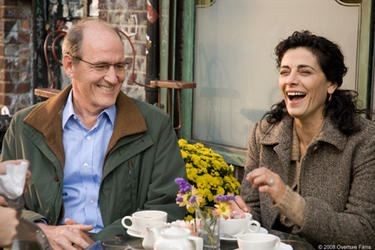The Visitor

The protagonist of The Visitor is Walter Vale, an academic who has retired from life after his wife’s death. A political economist at a small Connecticut college, Walter (played by Richard Jenkins) is no longer engaged with his students. He’s taken a reduced teaching load ostensibly to complete a book, but he’s not writing one. He makes a half-hearted effort at taking piano lessons—an attempt to stay close to the spirit of his wife, a pianist and teacher—but he finds something to object to in each of the teachers he hires: none can match his image of the woman he lost.
Jenkins and writer-director Tom McCarthy relay this information in a handful of understated scenes. Walter is set up as for a life-altering experience. He gets it when, reluctantly fulfilling the demand of his department chair that he deliver a paper at a conference in New York, he returns to the Manhattan apartment he’s abandoned since grief set him adrift. He finds ensconced there a Syrian musician named Tarek (Haaz Sleiman) and his Senegalese girlfriend, Zainab (Danai Gurira), who sells her jewelry on the street. Apparently they got the apartment through a shady middleman who claimed that it was vacant.
The Visitor belongs to the subgenre of movies in which the main character has been traumatized and made numb to life but is resurrected through a relationship or cause. Terry Gilliam’s The Fisher King and John Boorman’s Beyond Rangoon are examples, and McCarthy’s previous movie, The Station Agent, about a reclusive dwarf (Peter Dinklage) who inherits a half-acre of land and finds himself absorbed into a small community, is a variation on it.
Walter reaches out to Tarek and Zainab—he invites them to stay and then intertwines his life with theirs. Tarek teaches Walter how to play the djembe, an African drum played by hand, and this exotic instrument restores in him a capacity for joy that he believed he’d forfeited forever. Playing the piano only reminded him of what he’d lost; the drum affords him the chance to make music on his own.
When Tarek is arrested by mistake and his illegal-immigrant status is discovered, Walter feel responsible. His emotional involvement extends to Tarek’s mother, Mouna (Hiam Abbass), who gets worried about her son when she stops hearing from him and shows up on Walter’s doorstep.
The title of the film refers not only to Tarek and Zainab but also to Walter, who had become a visitor to his own life. The movie is a fable, though McCarthy has a relaxed touch with the material and is far from dogmatic. Visually the film is rather drab, and there’s one brief scene of Walter drumming alone in his boxers when the movie’s considerable charm turns precious.
Otherwise it’s a perfect small movie with a surprisingly wide emotional palette. Abbass and Gurira are exquisite camera subjects. Abbass plays Mouna with equal parts dignity and sensuality. Gurira’s Zainab is reserved but capable of bursts of feeling that light up her face. Sleiman’s Tarek reveals an eager, boyish conviction. But the heart of the film is Jenkins’s performance, which balances between Walter’s habitual recessiveness and his impulse to yield—an impulse so unfamiliar to him that it keeps catching him (and the audience) off guard. Jenkins is a veteran stage, film and TV character actor who has never before been put at the center of a movie. This balding actor in his 60s seems an unlikely star, but he is a master performer. He constructs Walter Vale out of dozens of tiny behavioral details and subtle shifts of tone. It’s acting magic.





